Previous Lectures of the World Science Café

Film presentation “Science in Exile” with discussion
05.12.2018
Film by Nicole Leghissa and discussion with affected researchers
Neoliberal Regimes and Their Gendered Body-Bio-Politics: The Case of AKP in Turkey
20.06.2018
Prof. Dr. Betül Yarar
University of Bremen, Educational Sciences
Refugees and Migrants – Social and Economic Integration
07.02.2018
Afaf Rahim
Institute for World Economics, University of Kiel
The Syrian Crisis – A Philosophical and Legal Overview
12.12.2017
Dr. Anan Alsheikh Haidar
Institute for International Peace and Security Law, University of Cologne
Dr. Housamedden Darwish
Department of Oriental Studies, University of Cologne
The Rise of Authoritarianism in Turkey
19.07.2017
Dr. Zafer Yilmaz
Faculty of Economics and Social Sciences, Potsdam University
On Refugee Lives, or A Note on Human Condition
15.02.2017
Prof. Dr. Hande Birkalan-Gedik (Turkey)
Institute of Sociology, Goethe-University Frankfurt
Syrian Cultural Heritage during the Crisis
01.02.2017
Prof. Dr. Ammar Abdulrahman (Syria), Archeology
Institute for Ancient Near Eastern Studies (IANES), Eberhard Karls University Tübingen
Foreign Involvement in the Syrian Conflict: Status Quo and Prospects
30.11.2016
Prof. Dr. Hussein Almohamad (Syria), Anthropogeography
Institute of Geography, Justus-Liebig-University Gießen
Film presentation “Science in Exile” with discussion
Wednesday, 5 December 2018, 6 pm
Venue: NTI-lecture hall, building 30.10, KIT Campus South
Film by Nicole Leghissa and discussion with affected researchers
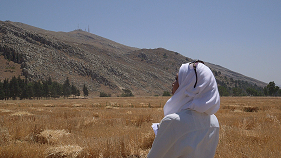 © Nicole Leghissa/TWAS |
“Science in Exile” “Four researchers, in flight from war. They dream of science in a time of peace” |
The film “Science in Exile” by Nicole Leghissa portrays researchers from Syria, Yemen and Iraq, who were forced to leave their homeland and to pursue their research in another country. The presentation was followed by a discussion with affected researchers. More information about the film is available on the website of the World Academy of Sciences.
This was the kickoff event for the workshop "Threatened Researchers - Science in Exile. Shared Responsibilities", which was held on 6th December 2018 at KIT in cooperation with the International Scholars and Welcome Office (IScO) and the Humboldt Regional Group Karlsruhe-Pforzheim e. V. and the Alexander von Humboldt Foundation.
Neoliberal Regimes and Their Gendered Body-Bio-Politics: The Case of AKP in Turkey
Wednesday, 20 June 2018, 6 pm, Venue: Foyer of the Presidential Building (Adolf Würth Building, bldg. 11.30), Ehrenhof, Engelbert-Arnold-Str. 2, KIT Campus South - Campus Map (pdf, approx. ca.1 MB)
In her lecture, the Turkish sociologist Prof. Dr. Betül Yarar will discuss how the female body and female sexuality are exploited in contemporary Turkish politics to strengthen neoliberal and neoconservative trends. She will analyse the phenomenon alongside the observation that on one hand, the regime increases homogenisation tendencies and tries to ensure control over the female body, while on the other hand, a large part of the success of this politics is owed to its extraordinary appeal to female voters.
- Prof. Dr. Betül Yarar
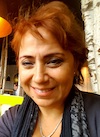 |
Until 1 September 2016, Prof. Dr. Betül Yarar had been working as a professor at the Faculty of Communications of Gazi University in Ankara. At this date, however, when she was due to hold lectures in a summer school at Sciences Po Lille in France as a visiting scholar, she was dismissed from her position with the use of a special decree by the Turkish AKP government. For this reason – after finishing her academic programme in France – she came to the University of Bremen as a Philipp Schwartz Fellow by the Alexander von Humboldt Foundation. Since February 2016, she has been carrying her academic life here in Germany at the University of Bremen. In 1994, she received her MA in sociology from the University of Essex and in 2000 her PhD in sociology from the University of Lancaster. After earning her PhD, she continued to work on popular culture and its relation to politics (particularly neoliberal politics in Turkey). Later on, she enlarged her areas of interest and began to engage with new social and feminist movements, feminist theory, and body politics, particularly all in the context of modernisation and neoliberalism history in Turkey. Recently, she has started to work on a project named ‘Neoliberal-Neoconservative Biopolitics of AKP and Counter-Strategies of Feminist Groups in Women’s Movement in Turkey’. Within this context, she organised an international symposium with the title ‘Health, Reproduction & Sexuality: Neoliberal-Authoritarian Modes of Governing the Woman’s Body in Turkey’ which took place in Bremen from 5 to 6 April 2018. |
Refugees and Migrants – Social and Economic Integration
Wednesday, 07 February 2018, 6 pm, Venue: Foyer of the Presidential Building (Adolf Würth Building, bldg. 11.30), Ehrenhof, Engelbert-Arnold-Str. 2, KIT Campus South - Campus Map (pdf, approx. ca.1 MB)
"Labour market integration is the overarching goal of immigrants’ integration – specifically in the case of refugees and family migrants. Social integration represents an equally important concern, in particular given that concerns of the native population are often related to non-economic factors. The causal relationship between economic and social integration, however, has not been established. There are two competing contentions about the link between immigrants’ labour market outcome and social integration. The first claims that better social integration is associated with higher chances of labour market success, the second argues that unequal economic opportunities and structural constraints that alienate immigrants from the job market also reduce their incentives to adapt to the host society’s norms and cultures. In this talk, I will take a look at the interaction between economic and social integration of third country nationals (refugees and migrants). I will focus particularly on refugees’ labour market integration barriers and on two important policy related questions: 1) Could policies aimed at facilitating refugees' and migrants' employment also have a positive effect on social integration? 2) Are there additional unemployment costs for immigrants (e.g. caused by social disintegration)?"
- Afaf Rahim
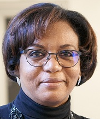 |
Afaf Rahim Institute for World Economics, University of Kiel Afaf Rahim is a researcher at the Kiel Institute for the World Economy (IfW). She is part of the research team working on the MEDAM project (Mercator Dialogue on Asylum and Migration). Within MEDAM, Rahim’s research focuses on the economic and social integration of immigrants. Rahim holds a PhD in Economics from the University of Wageningen; she previously worked as junior professor at the Center for Near and Middle Eastern Studies of the University of Marburg and was a postdoctoral researcher at the University of Pretoria. Furthermore, she is a resource person at the African Economic Research Consortium (AERC). Her research interests are multi-disciplinary in scope, spanning several fields of study, from agriculture and natural resource management to poverty and social impact analysis. |
The Syrian Crisis – A Philosophical and Legal Overview
Tuesday, 12 December 2017, 6 pm, Venue: Foyer of the Presidential Building (Adolf Würth Building, bldg. 11.30), Ehrenhof, Engelbert-Arnold-Str. 2, KIT Campus South - Campus Map (pdf, approx. ca.1 MB)
Tuesday, 12 December 2017, 6 pm
Dr. Anan Alsheikh Haidar
Institute for International Peace and Security Law, University of Cologne
Dr. Housamedden Darwish
Department of Oriental Studies, University of Cologne
In March 2011, a peaceful uprising against the government erupted in Syria, which Syrian security men and troops under Bashar al-Assad cruelly and quickly suppressed. The brutal suppression of the peaceful protesters caused more violence to escalate and led the country into a conflict. This conflict has created one of the worst humanitarian crises in the 21st century. About half a million people were killed. 11 million people – about half of the Syrian population – have fled their homes and more than 13 million people are in urgent need of assistance. The violence continues in Syria, and war crimes and crimes against humanity have been committed. Different names have been used to label the Syrian crisis, namely civil war, proxy war, and revolution. In this context, the question arises which name or names best express what has been happening in Syria. The Syrian crisis – under whatever label – poses another important question relating to justice: What are the possibilities of bringing those who committed crimes in Syria to justice? In order to answer the aforementioned questions, the talk starts with discussing the names labelling the Syrian revolution in attempt to understand this crisis. Secondly, it will explore the prospects of pursuing international criminal justice in the Syrian case.
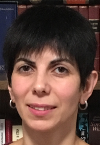 |
Dr. Anan Alsheikh Haidar Institute for International Peace and Security Law, University of Cologne Dr Anan Alsheikh Haidar, born in 1977, studied at the Law School of Damascus University, Syria, and received her Diploma in Law in 2000. In 2005, she earned her Master of Laws (LL.M.) in Advanced Legal Studies as Chevening Scholar at the Law School of Reading University, UK, which was followed by her PhD in Law in 2010 in the principal subjects of International Criminal Law and International Human Rights Law, Research Methods and International Security Studies. She worked as lecturer at the Law School of Damascus University from 2010 to 2014 as well as at the Syrian Virtual University. Dr. Haidar has issued publications on International Law and has participated in lectures worldwide, most recently about the Syrian Conflict and International Criminal Law. Since 2016, she has been a research fellow at the Institute of International Peace and Security Law of Cologne University, Germany. |
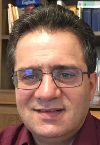 |
Dr. Housamedden Darwish Department of Oriental Studies, University of Cologne Dr Housamedden Darwish, born in 1971, studied Philosophy at Tishreen University in Latakia, Damascus University, and Aleppo University in Syria. He earned his Master degree in Philosophy at Bordeaux University which was followed in 2010 by his PhD in Philosophy on the French philosopher Paul Ricœur. He worked as freelance researcher, visiting researcher, and teaching assistant on the subjects of Eastern philosophy and the Arab uprising, and on transcultural concepts, as well as on Islam and Political Modernity. Dr Darwish participated in presentations and panel discussions worldwide, with a focus on the Syrian philosopher, professor, and human rights activist Sadiq Jalal al-Azm. He has numerous publications in magazines about the situation in Syria, about an uprooted nation, and the Arabic state of mind. Furthermore, he published several books about the French philosopher Paul Ricœur as well as ‘Critical Texts on Arab Political Thought, Syrian Revolution and Asylum’ (Beirut: Arab Scientific Publishers Inc, 2017). Currently, Dr. Darwish is a fellow of the Volkswagen Foundation project ‘A Study in Explanatory Power’, as well as Assistant Professor at the Department of Oriental Studies of Cologne University and at the Department of Philosophy of Duisburg-Essen University, Germany. |
Embedded into the Workshop - Threatened Researchers - The Power of Science. The meeting on December 12, 2017, 2 pm, aims at raising and sustaining awareness about this important topic and to address the needs of this especially vulnerable group of mobile researchers. Even more so we hope to promote the dialogue and mutual understanding among fellow researchers and fathom out the possibilities of supporting threatened researchers e.g. via networks such as the Humboldt network. Program
The Rise of Authoritarianism in Turkey
Transformation of Rule of Law and Suppression of Freedom of Speech
Wednesday, 19 July 2017, 6 pm, Venue: Foyer of the Presidential Building (Adolf Würth Building, bldg. 11.30), Ehrenhof, Engelbert-Arnold-Str. 2, KIT Campus South - Campus Map (pdf, approx. ca.1 MB)
 |
Dr. Zafer Yilmaz Faculty of Economics and Social Sciences, Potsdam University Turkish democracy is currently experiencing one of its most crucial crises since the failed coup in mid-July 2016. Right after the declaration of the State of Emergency, the government started a huge restoration process which found its repercussion in public administration, civil society and politics. The talk will discuss this recent transformation of Turkish democracy, focussing on the latest constitutional amendments, the extended State of Emergency and current political developments. Furthermore, recent political developments have been affecting the institutional structure of the state, public space and democratic politics in Turkey. Hence, they will be analysed in order to highlight the potential impact of them on the regime change in Turkey. In this context, it will be argued that these developments paved the way for the transition from authoritarian populism to “plebiscitary authoritarian regime” in Turkey. After clearing the characteristics of Turkish politics and the main tendencies which support rising authoritarianism today, the extended State of Emergency – that provides the current regime change with the necessary authority – will be at issue. Current measures towards the suppression of the freedom of speech remain right at the centre of this transition. Finally, the general characteristics of the emerging plebiscitary regime in Turkey will be outlined so as to shed light on the specific form and defining aspects of this regime. Will the current policies increase the de-institutionalisation of the state and possibly result in further erosion of state power, de-politicisation of society, suppression of the opposition and intensification of the authoritarian tendency in Turkish politics? Dr. Zafer Yılmaz studied at the Departments of Sociology and Political Science and Public Administration at the Middle East Technical University in Ankara from 1999 to 2004. He held research positions at the Department of Sociology at Free University of Berlin, the Department of Politics and History at Brunel University London and at Ankara University, where he finished his PhD on “Poverty and Uncertainty: Management of Poverty and Constitution of Social Question” in 2011. From 2013 to 2014 Yilmaz was a visiting scholar at the Department of Sociology at the University of California, Berkeley. Since 2017 he works as a visiting scholar at Potsdam University, at the Faculty of Economics and Social Sciences, Centre for Citizenship, Social Pluralism and Religious Diversity. Dr. Yilmaz has published widely and has taken part in several international conferences and workshops concerning his research interests in labour and the role of the state, tradition and the culture of political protest and, more recently, the rise of authoritarianism, transformation of rule of law and the suppression of free speech in Turkey. |
On Refugee Lives, or A Note on Human Condition (Lecture in English)
Wednesday, 15 February 2017, 6 pm, Venue: Foyer of the Presidential Building (Adolf Würth Building, bldg. 11.30), Ehrenhof, Engelbert-Arnold-Str. 2, KIT Campus South - Campus Map (pdf, approx. ca.1 MB)
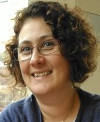 |
Prof. Dr. Hande Birkalan-Gedik (Turkey) Institute of Sociology, Gender Studies, Institute of Sociology, Goethe-University Frankfurt “Ours is a century of uprootedness, with fewer and fewer people living out their lives where they are born,” once wrote Michael D. Jackson (Harvard Divinity School), astutely pointing out the human condition of our century. More and more people leave their homelands for various reasons and live in places different from where they were born. Prof. Dr. Hande Birkalan-Gedik is a specialist in anthropology, folklore, and gender studies. Following her education at Boğaziçi University Istanbul, she completed a dual MA/PhD programme at Indiana University Bloomington, USA. She has taught courses on migration, gender, nationalism, space and narrative, feminist theories and methods, research methods, the theory of anthropology, and the history of folklore, in the USA, Europe, Central Asia, the Caucasus, and the Middle East, among others. Currently, Birkalan-Gedik is a guest professor at the Goethe University in Frankfurt am Main. She co-edited a collection entitled Gelenekten Geleceğe Antropoloji (Anthropology from Tradition to the Future, 2005). Her recent book, Sınırlar, İmajlar, Kültürler (Borders, Images, Cultures, 2013) is also an edited volume, including an article by Birkalan-Gedik on Turkey. She is the guest editor of the special issue of Folkloristics of the journal Folklor/Edebiyat (Folklore/Literature, 2000). From 2014 to 2015, she completed a project on fathers with a Turkish migration background living in the Rhein-Main region. Two books, Feminist Antropoloji: Türkiye’den ve Dünyadan Kültürlerarası Perspektifler (Feminist Anthropology: Intercultural Perspectives from Turkey and the World) and Changing Paradigms of Anthropology in Turkey: Intersecting European Ethnology and American Anthropology, are planned for publication in 2017. |
Syrian Cultural Heritage during the Crisis
Wednesday, 01 February 2017, 6 pm, Venue: Foyer of the Presidential Building (Adolf Würth Building, bldg. 11.30), Ehrenhof, Engelbert-Arnold-Str. 2, KIT Campus South - Campus Map (pdf, approx. ca.1 MB)
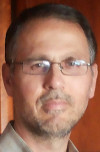 |
Prof. Dr. Ammar Abdulrahman (Syria) Archeology, Institute for Ancient Near Eastern Studies (IANES), Eberhard Karls University Tübingen Throughout history, international cultural heritage has suffered harmful effects from natural phenomena such as earthquakes and volcanic eruptions – and it has also suffered from human actions and struggles such as wars. Syria serves as a recent example, highlighting the important case that, in a place that has been considered the heritage of one of the most ancient civilisations in the world, cultural richness is now in danger because of the ongoing crisis. As a direct consequence of a war which has lasted five years by now, some of the archaeological sites have been totally destroyed by attacks from radical Islamic groups. In addition some sites have been transformed into battlefields, and as an indirect consequence, are witnessing dangerous attacks from armed gangs of looters. This is a disaster for Syrian cultural heritage, and the destructions are now in their fifth year with no end in sight. This leaves us all in an unprecedented situation which requires urgent action – especially as this danger does not only persist in Syria, but in other Middle Eastern countries as well, such as Iraq, Egypt, and Libya, which are facing similar acts threatening their cultural heritage. Prof. Dr. Ammar Abdulrahman studied Ancient History and Ancient Near Eastern History in Damascus and Constance. In 2006, he received his PhD from Damascus University. From 2005 onwards, Abdulrahman served as director of the Department of Museum Affairs at the Directorate-General of the Syrian Antiquities Service, before he became director of the Al-Basil Center for Archeological Research in Damascus in 2008. Since 2010, Abdulrahman has been project leader and editor of the multi-volume Archaeological Encyclopaedia in Syria. He has held diverse lectureships, among others at Damascus University’s Faculty of Archeology, where he has been director since 2013. From 2014 to 2015, he was a deputy professor of archaeology at the University of Konstanz. In 2014, he became a member of the Arab-German Young Academy of Sciences and Humanities (AGYA) at the Berlin-Brandenburg Academy of Sciences and Humanities. Abdulrahman has published numerous books as well as essays in renowned journals and encyclopaedias. He has led major field archaeological projects and has frequently been invited to international congresses as an expert. In 2016, he took up a position at the Eberhard Karls University of Tübingen’s Institute for Ancient Near Eastern Studies (IANES). He is currently involved in a research project on Bronze Age settlement development in Syria and northern Iraq. In both countries, Ancient settlements will be mapped with the help of modern geo-information systems. The project aims to contribute to the preservation of cultural heritage in Syria and Iraq. In cooperation with the German Commission for UNESCO. Following discussion with Prof. Dr. Hartwig Lüdtke. |
Opening Lecture: Foreign Involvement in the Syrian Conflict: Status Quo and Prospects
Wednesday, 30 November 2016, 6 pm, Venue: Foyer of the Presidential Building (Adolf Würth Building, bldg. 11.30), Ehrenhof, Engelbert-Arnold-Str. 2, KIT Campus South - Campus Map (pdf, approx. ca.1 MB)
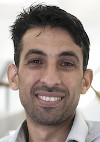 |
Prof. Dr. Hussein Almohamad (Syria) Guest Professor, Anthropogeography, Institute of Geography, Justus-Liebig-University Gießen In 2011, in the early stages of anti-government protests, various groups of the population were involved in the revolution, which finally escalated into armed conflict. Since then, a number of further religious and ethnic conflicts have arisen: with the flow of money and weapons from abroad, and the involvement of mercenary groups, the conflict increasingly takes the form of a proxy war in Syria and the Middle East. After five years of war, four major conflict parties are emerging: the Assad regime, the Islamic State (IS), the autonomous Kurdish region “Rojava”, and the rebels. By now, more than 80,000 foreign fighters have been involved in the conflict. The lecture will analyse the phenomenon of foreign volunteer fighters, their motivations for getting involved in the Syrian conflict, as well as the prospects of this involvement. Prof. Dr. Hussein Almohamad studied geography in Damascus and then took up a position as an assistant at the Department of Geography, at the University of Aleppo’s Faculty of Arts and Humanities. In 2009, he received his PhD from Justus-Liebig-University Gießen after completing a dissertation in the field of climate change and natural hazards. From 2009 to 2013 Almohamad taught climatology, natural hazards, and political geography as an assistant professor at the University of Aleppo. In 2014, he returned to the Justus-Liebig-University Gießen as a visiting professor in the field of human geography and development research. |
